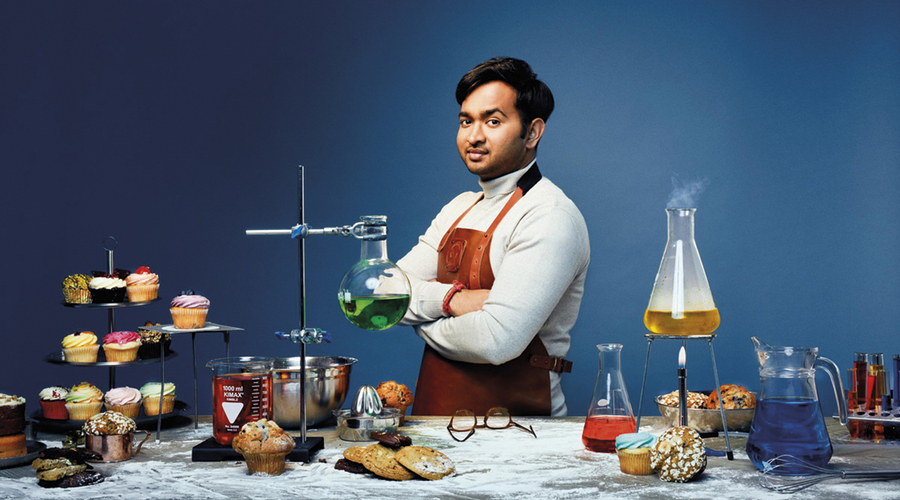Tara Conlan finds much to chew on at an RTS event on TV food shows
With 87 days’ worth of cookery shows airing during the past year on UK terrestrial television – made up of 410 unique titles – the RTS event “Why we love… food” was appositely named.
Revealing the facts to an audience hungry for knowledge about the genre, Pritesh Mody, founder of artisan food producer World of Zing, chaired the late-May event on the day it emerged that Jamie Oliver’s UK restaurant chain had gone into administration.
So, there was extra piquancy when Channel 4 head of features and formats Sarah Lazenby confirmed that she had ordered a new vegetarian series with Oliver and a programme looking back at his life on TV.
“We’re going to do something this year about Jamie 20 years on – and he’s going to do a new vegetarian series because everyone’s wanting to go meat-free,” said Lazenby.
With food shows a staple of TV globally, Lazenby explained their popularity: “Food always rates; it’s great, everyone needs to eat. It’s about how you innovate. I think you can make food programmes for everyone. We’ve got some amazing cornerstones in our schedule… but I still feel like there’s room for a new generation of Instagram food shows.”
"That’s the joy of someone like [Bake Off winner] Rahul [Mandal] – he wouldn’t have applied for Love Island, would he?”
Tanya Shaw, Managing Director of Shine TV, which makes MasterChef, said that new talent and a digital strategy are key to attracting young audiences to food TV shows. These demographics are used to seeing chefs on social media. However, the panel agreed that no major social media food talent has yet moved over to hosting their own broadcast show.
Shaw added: “MasterChef keeps us quite busy and we also do things with Mary Berry and we are starting to look at new talent.… These things are cyclical. Every so often, there is the next Jamie or [a] person who does capture the nation’s imagination because they feel really passionately about an issue that feels of the moment or because they are really extraordinary in terms of their character.”
Mody asked whether restaurant culture is being driven by TV or vice versa. Restaurateur Nisha Katona, who is a judge on BBC Two’s Top of the Shop with Tom Kerridge and founded Indian restaurant mini-chain Mowgli Street Food, said: “I don’t think you could possibly commission programmes at the speed we, as consumers, evolve our food on the street. What TV does is produce something that provides a comfortable place for us, as middle-class food intelligentsia, to come and sit and unwind and think, ‘This is a safe and noble place for me.’”
Discussing the collapse of Oliver’s restaurant empire, Katona said: “It’s interesting with Jamie and the restaurants – what is that nexus, is there a nexus? Is the success of your restaurant dependent on how good you are on TV as a presenter?”
Chefs, Mody pointed out, have a lot of clout: “Delia is still super-influential. Over Christmas, when she and Nigella talk about their key ingredient, Waitrose sells out in half a day, so they still have influence.”

In a crowded market, Channel 4’s Lazenby is looking for original ingredients for new shows: “If people bring me something that does, ‘It’s this meets this’, I’m like, ‘No, how is this going to surprise me?’ I want the programmes [in which] people are really passionate. The ones that cut through are very simple, very clear, very original; executed by someone who’s got a passion for it.”
Shaw noted that if shows “are on for a long time, they have to evolve. If you’re just following the same formula, series in and series out, people won’t come back.”
Contestants on food shows are driven by skill, observed Lazenby: “They’re not on telly because they want to be on telly; they’re on telly because they love baking or cooking. And, actually, that’s the joy of someone like [Bake Off winner] Rahul [Mandal] – he wouldn’t have applied for Love Island, would he?”
Shaw said that new outlets such as Netflix “provide more opportunities. Interestingly, MasterChef, as a format, doesn’t seem to be suffering, because there are more options to watch on Netflix.… It’s another place we can pitch ideas to, where exciting cookery shows are doing well.”
Netflix US original Nailed It! is one such “brash” show – it’s “brave and it works”, said Shaw, adding: “I’m not sure a British broadcaster would take that sort of risk, but I think, having seen it succeed on Netflix, maybe they will. The more food programmes that work, the better it is for everyone.”
After watching a clip of Nailed It! – in which unsuccessful home bakers try to recreate edible masterpieces to win a cash prize – Katona observed: “It’s like The Generation Game.” Lazenby noted: “A lot of food programming has joy in it.”
The panel agreed that making cookery shows was hard and required specialist skills such as using the right camera lenses and getting the “sound of the sizzle”, as chef and cookbook author Melissa Hemsley put it.
Hemsley said that sustainability and thrifty tips were current trends: “What can I do with peelings? I wish there were more shows where the farmers were shown cooking the meal.”
The RTS early-evening event ‘Why we love… food’ was held at Kings Place in central London on 21 May and produced by Sarah Booth, director of communications at EndemolShine UK.




